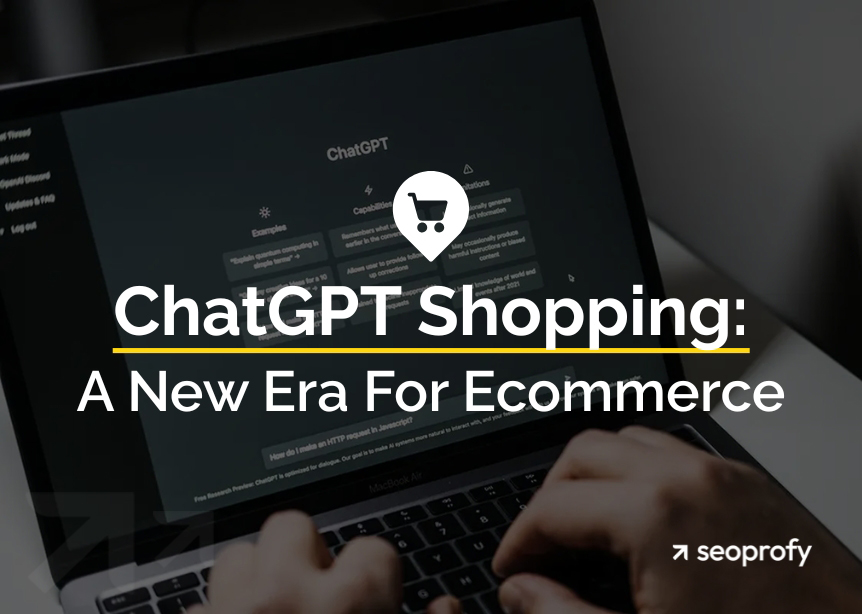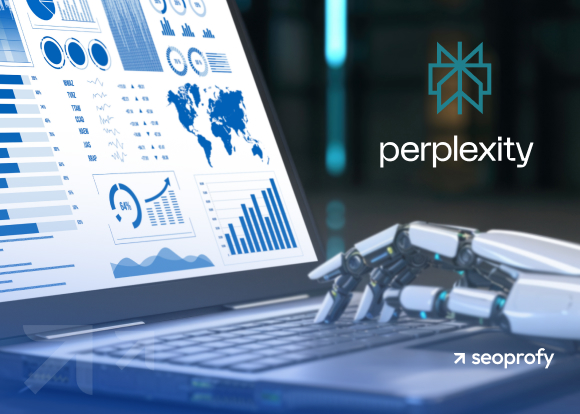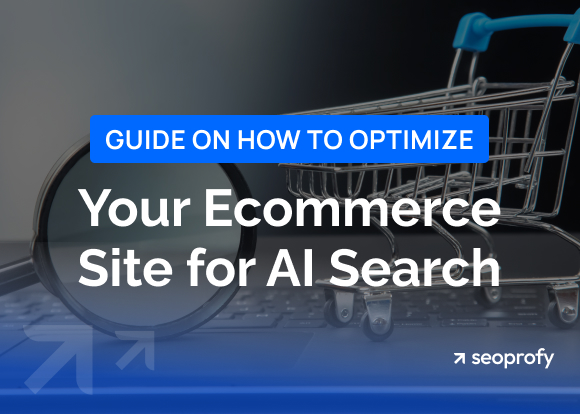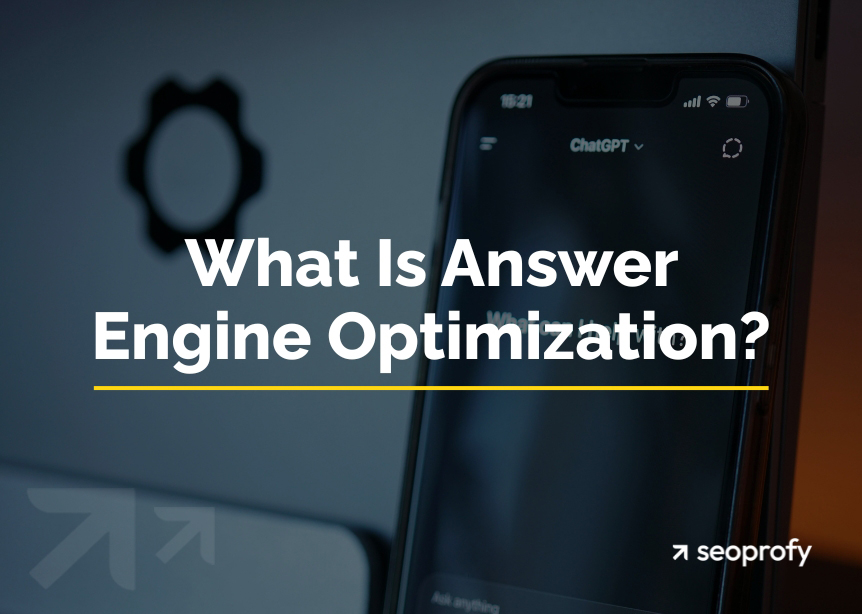Many businesses already use AI for their search engine optimization tasks. This proves that AI’s impact on SEO is growing every day, and those who know how to use it will have a sizable advantage over those who don’t.
Artificial intelligence is currently changing many industries, and SEO is one of them. That’s why we’ve compiled the key AI SEO statistics for 2025-2026 to show how it’s transforming the marketing field and why you need to start using it in your campaigns.
- 86% of SEO professionals have integrated AI into their strategy.
- 67% of SEO experts believe the key benefit of generative AI is in automating repetitive tasks.
- 65% of businesses have noticed better SEO results with the help of AI.
- 75% of marketers leverage AI to reduce the time spent on manual tasks like keyword research and meta-tag optimization.
- 35% of companies use AI to create SEO-driven content strategies.
- 52% of SEO professionals noticed performance improvement from using AI for on-page SEO.
- 82% of enterprise SEO specialists plan to invest more in AI.
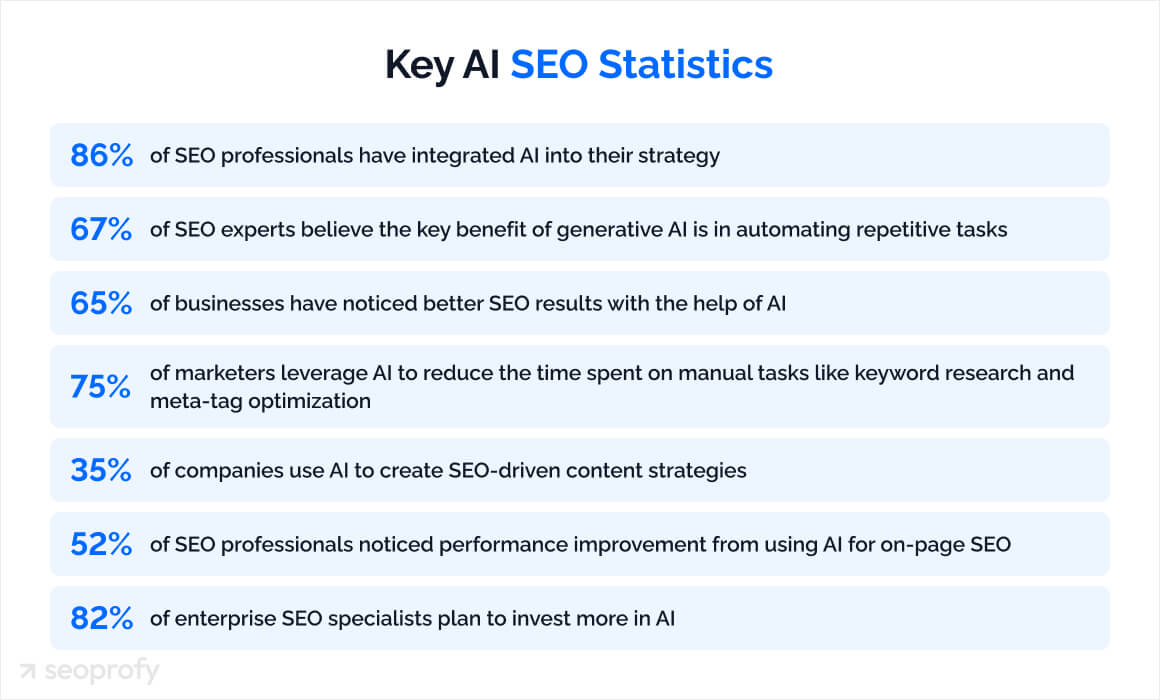
Top AI SEO Statistics
Capgemini’s research shows that the top uses of generative AI in marketing are data analysis (62%), personalized customer experience (60%), campaign creation (56%), and search engine optimization (56%).
Another marketing report suggests that marketers use AI tools for time-consuming SEO tasks like keyword research, writing optimized meta-tags, structuring articles, and even analyzing competitors.
You can also create CTAs and headlines with generative models and later test them to find the ones that perform the best. With all these use cases covered, let’s look at some recent SEO statistics:
- 86.07% of SEO professionals have already integrated AI into their strategy. (SeoClarity)
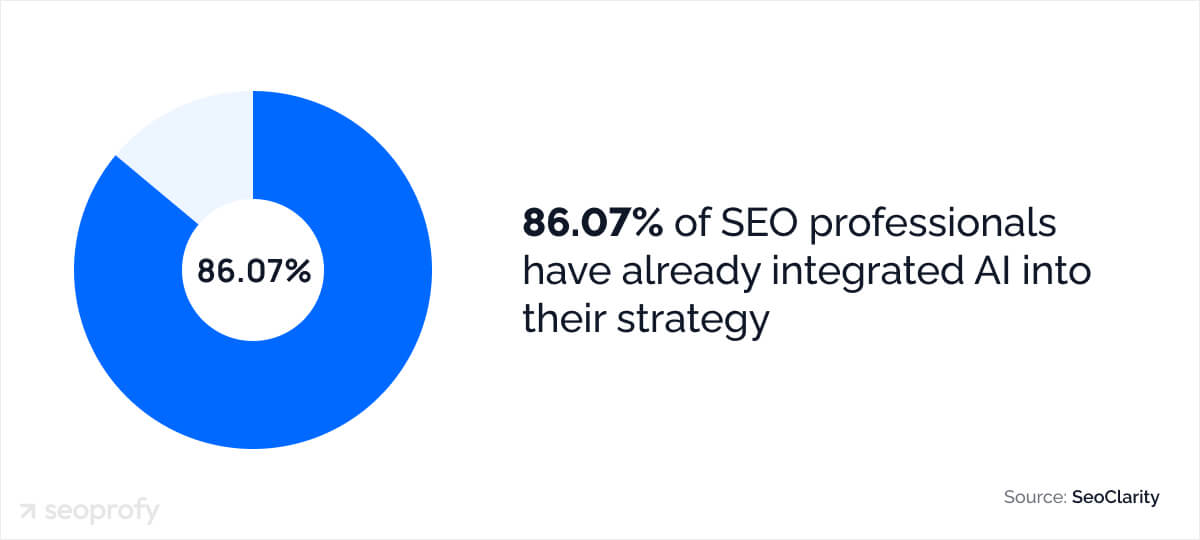
- 50% of companies in the U.S. use AI in their marketing initiatives. (Capgemini)
- Only 4.09% of SEO specialists believe that generative AI can’t enhance SEO in any way. (SeoClarity)
- 1 in 5 marketing teams was able to improve productivity by 50% with the help of AI. (FlyingCatMarketing)
- 46% of businesses use AI for personalized advertising. (Forbes Advisor)
- 67% of SEOs believe the key benefit of generative AI is in automating repetitive tasks. (SeoClarity)
- About 50% of marketers say that consumers using AI for search has had a positive impact on their website traffic. (HubSpot)
- 52% of marketers confirmed that the use of AI helped them improve efficiency and speed. (Statista)
- Businesses mostly use AI to generate content outlines (63%), followed by brainstorming ideas and keyword research (60%). (FlyingCatMarketing)
- 18.7% of SEO specialists believe that there will be significant industry changes in SEO due to AI and machine learning. (SearchEngineJournal)
- In 2025, 19% of marketers plan to add AI in search to their SEO strategy. (HubSpot)
- 64.48% of SEO experts prioritize the accuracy of AI tools over other factors. (SeoClarity)
- AI-powered tools save up to 50% of time spent on data analysis and interpretation. (Forbes Advisor)
- 75% of businesses leverage AI to reduce the time spent on manual tasks like keyword research and meta-tag optimization. (HubSpot)
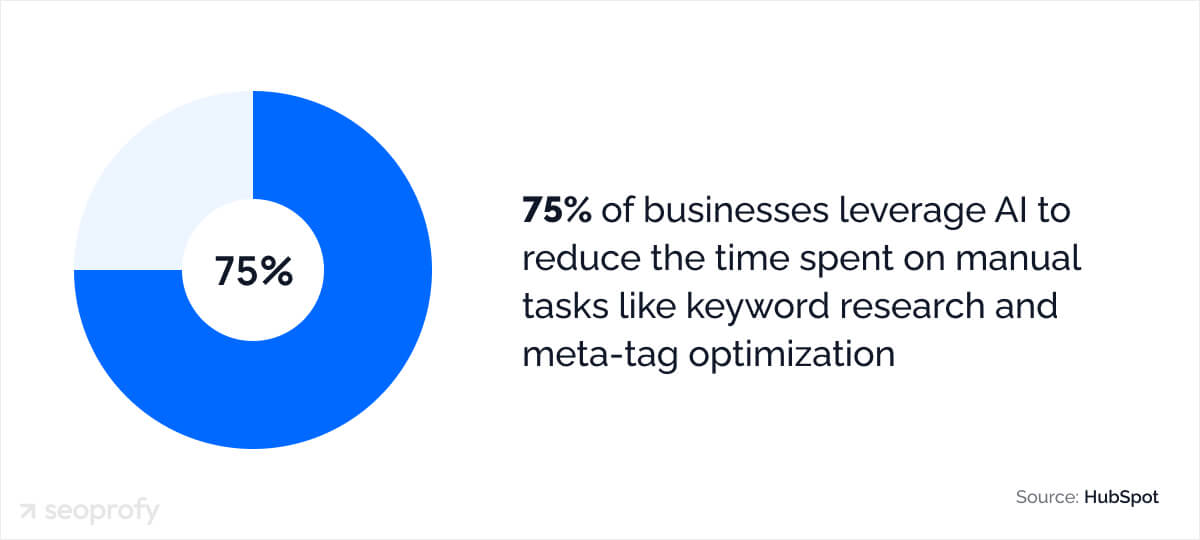
- 61% of marketers focus on improving SEO with the help of AI. (LinkedIn)
- AI is often used to find opportunities to acquire high-quality backlinks. (BruceClay)
- 25% of e-commerce businesses use AI to write product descriptions. (HubSpot)
- 58% of marketers believe ChatGPT will create a more personalized customer experience. (Forbes Advisor)
AI’s Statistics in Marketing Performance
AI is changing the field of marketing with better data analysis, personalized user experiences, and better productivity of sales teams. For example, AI-driven SEO campaigns can increase organic traffic for e-commerce businesses and improve the effectiveness of on-page SEO.
Companies that use artificial intelligence can also create more targeted advertising, which drives more sales. But that’s not all. Here are some more AI SEO statistics showing how AI can boost performance:
- 68% of marketers have seen a positive uplift in ROI after using AI. (HubSpot)
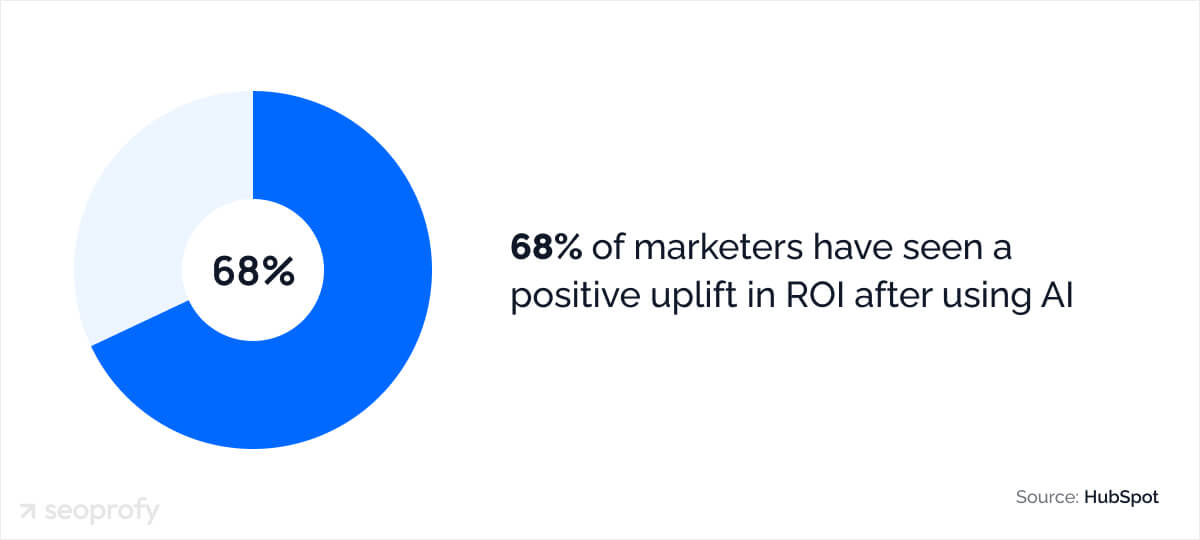
- Companies that use generative AI to improve customer experiences can generate 25% more revenue in five years than those that only focus on productivity. (Accenture)
- 65% of businesses have noticed better SEO results with the help of AI. (Semrush)
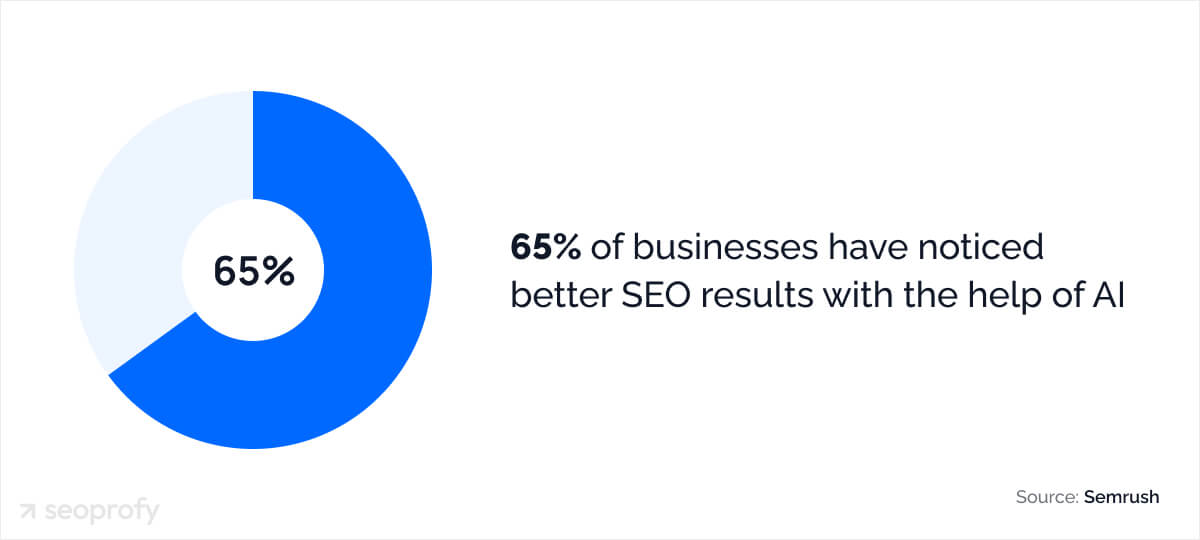
- 26% of B2B marketers who used chatbots in their marketing increased lead generation by 10-20%. (Statista)
- 83% of respondents from companies with more than 200 employees noted improved SEO performance since using AI. (BruceClay)
- 68% of marketers confirm that AI helped them achieve higher ROI. (Semrush)
- Gen AI could increase productivity by between 5 and 15 percent of total marketing spend, worth about $463 billion annually. (McKinsey)
- 52% of SEO professionals noticed performance improvement in using AI for on-page SEO. (SeoClarity)
- AI-driven SEO campaigns can lead to a 45% increase in organic traffic and a 38% increase in conversion rates for e-commerce businesses. (LinkedIn)
- 40% of marketers have seen a 6-10% increase in revenue after implementing AI in their SEO practices. (SEO.AI)
- Two-thirds of businesses that started using AI have seen their revenue growth rate increase by 25% or more. (IBM)
- 86% of marketers take time to edit the AI-generated content. (HubSpot)
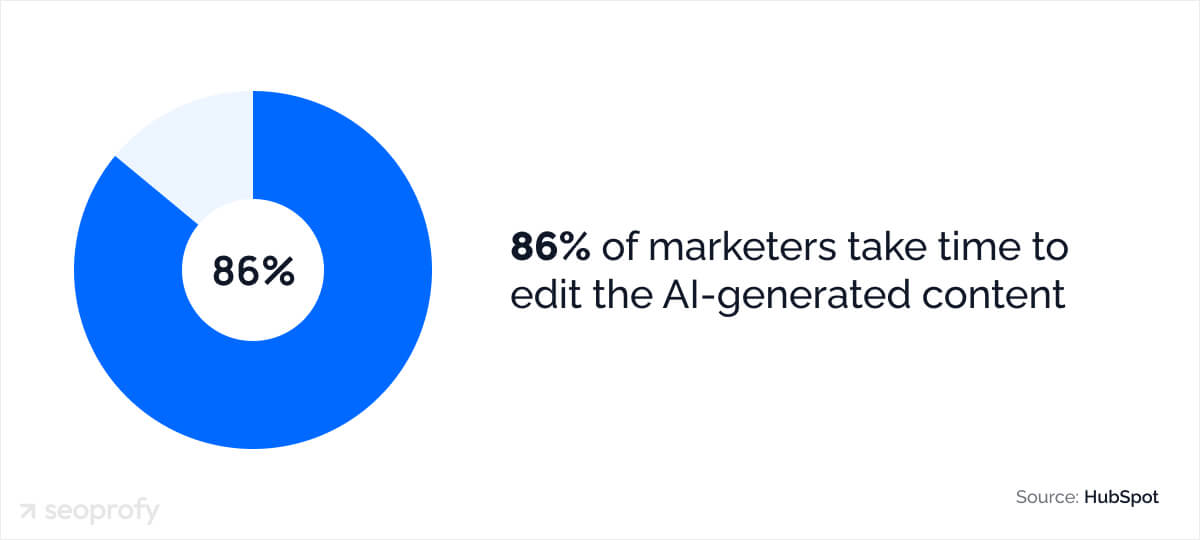
- Businesses that invest in AI see a revenue increase of 3 to 15 percent and a sales ROI uplift of 10 to 20 percent. (McKinsey)
- Headlines created with AI can increase click-through-rates up to 59%. (SEO.AI)
AI’s Statistics in Content Creation
One of the trending topics in SEO right now is how AI impacts the content creation process. The great news is that generative AI can significantly help marketers and business owners with tasks like initial research, ideation, meta tag creation, and A/B testing.
While AI tools can streamline the content creation process, you’ll still need to edit and revise the copy before adding it to your site. You’ll also want to make sure that all the target keywords are added naturally in the text so that your content can rank on search engines and bring in valuable leads.
When it comes to data, research shows that 67% of people see an improvement in content quality when using AI. That being said, let’s look at some other AI SEO statistics in content marketing:
- More than 50% of marketers optimize content with the help of AI. (SurveyMonkey)
- 42% of businesses use AI for long-form written content, especially for website copy. (Forbes Advisor)
- 67% of people see an improvement in their content quality after using AI. (Semrush)
- 26% of U.S. marketers use AI and machine learning to optimize their content. (Statista)
- 93% of marketers review their AI-generated content before publishing it. (Semrush)
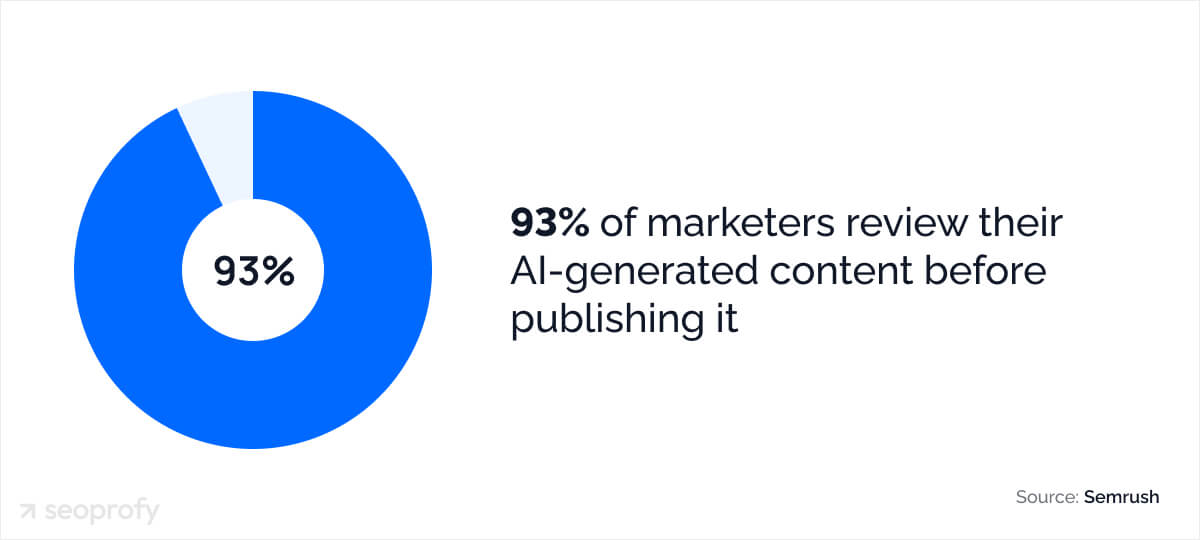
- Headlines generated with AI outperformed the human-written ones in 46% of the A/B tests conducted. (SEO.AI)
- 35% of companies use AI to create SEO-driven content strategies. (Forbes Advisor)
- 84% of marketers believe that the most effective use case of AI is to align web content with the intent of Google searches. (Statista)
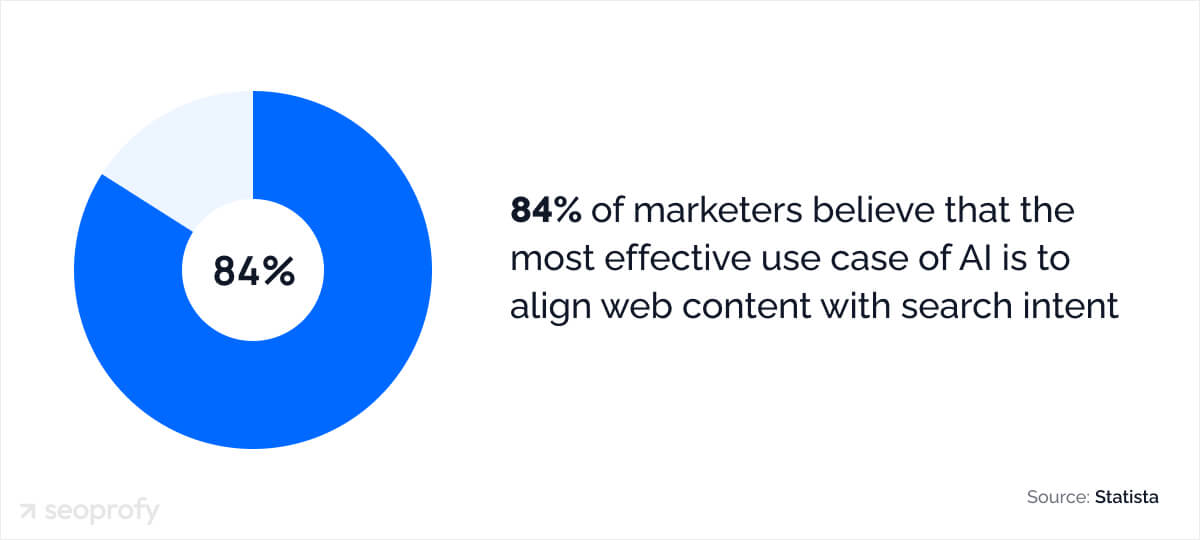
- 70% of businesses believe that ChatGPT helps them create content faster. (Forbes Advisor)
AI Adoption Statistics
AI is revolutionizing every industry with its ability to accurately perform tedious tasks. This helps to reduce the time spent on tasks and leads to better productivity.
Many companies have already started using AI to simplify their teams’ work. At the same time, 58% of SEO professionals aim to incorporate AI tools into their processes within the next year. Here are some AI SEO statistics that show this trend:
- 61% of marketers see AI as the key part of their strategy. (Semrush)
- 85% of marketing professionals believe that generative AI will have a big impact on content creation in 2024. (HubSpot)
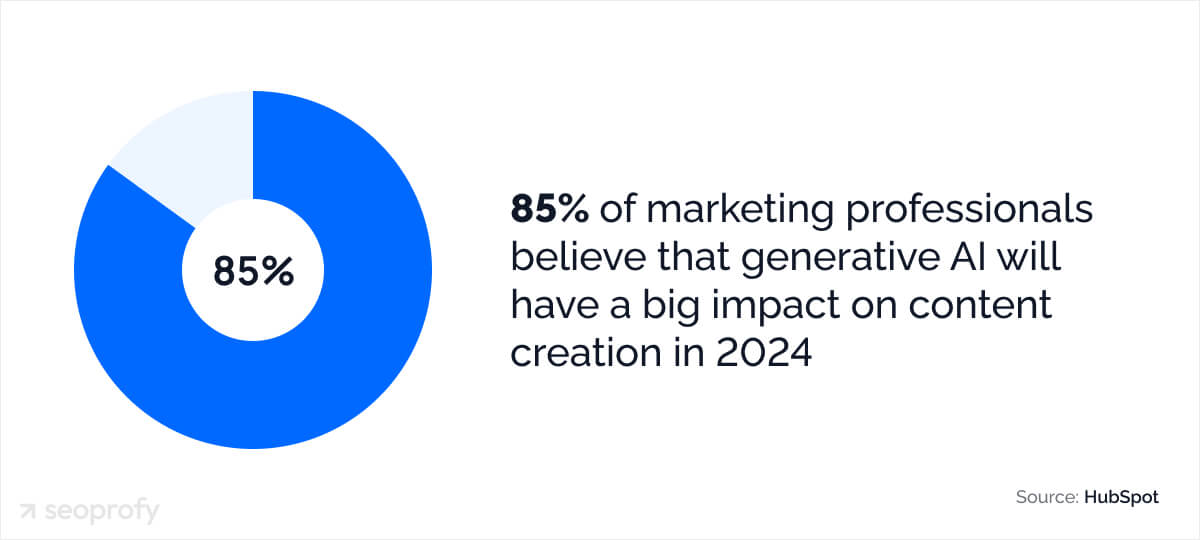
- More than 80% of businesses in retail and consumer space plan to use AI automation by 2025. (AnalyticsInsights)
- AI-based tools may increase the productivity of workers by up to 40% across 16 industries. (Forbes)
- 37% of businesses that don’t use AI don’t understand how it works. (Semrush)
- 51% of SEO specialists believe AI won’t impact their current strategies. (Forbes Advisor)
- 48% of marketing leaders have already invested in AI tools for their teams. (HubSpot)
- Almost 97% of business owners believe ChatGPT will help their business. (Forbes Advisor)
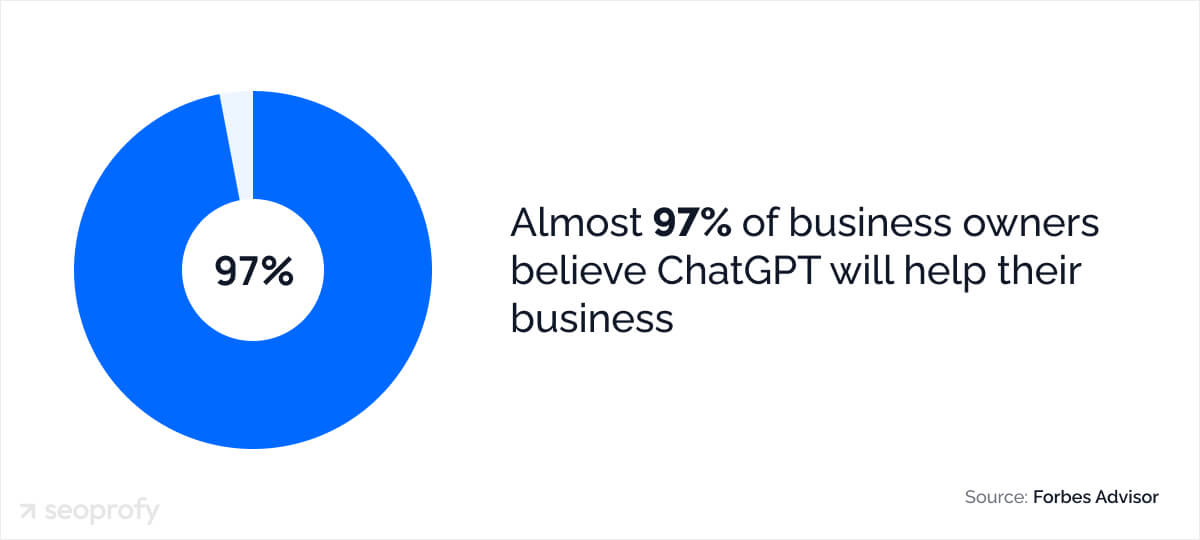
- 58% of SEO’s think about integrating artificial intelligence into their workflows. (BrightEdge)
- 82% of enterprise SEOs plan to invest more in AI. (SeoClarity)
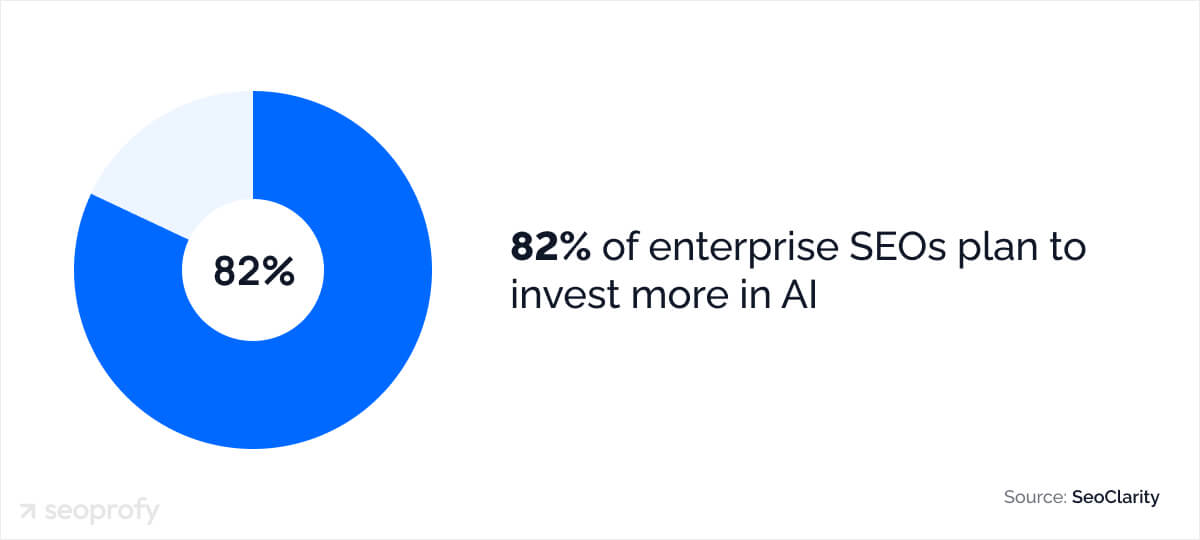
AI in Voice Search
Did you know that around 50% of U.S. consumers use voice search every day? This is especially the case for local mobile searches when internet users are looking for businesses nearby, like cafes or restaurants. Smart speakers and AI-powered voice assistants are becoming part of our daily lives, which means that companies need to take this into account when creating their SEO strategies.
As you probably guessed, AI can be your ally in this trend. It helps businesses understand the user intent behind the keywords and local search queries through natural language processing. It also picks up on patterns to predict future user behavior.
Long story short, artificial intelligence can help you optimize your brand for the voice search engine market, so you can count on better results from your SEO efforts. With AI, you’ll make it easier for potential customers to find you in organic search results and drive more traffic to your site. Here are some stats to show how AI-powered search is being adopted and how it’s expected to grow:
- There are currently over 88.8 million voice assistant users in the US. (Emarketer)
- Specific keyword usage (like “best,” “easy,” top,” and “list,”) in voice searches is expected to increase by 20%. (Synup)
- More than 4 billion devices already work on AI-powered voice assistants. (Statista)
- Voice search drives more than $2 billion in sales, which makes voice search optimization important for businesses that want to sell more and increase revenue. (Synup)
- Over 25% of people use the voice search function several times a day. (Statista)
Concerns Regarding Using AI in SEO
While using AI has plenty of benefits, many businesses still have their concerns. 33% fear that it will change the workforce as we know it and lead to job losses.
Another aspect is misinformation. 30% believe that generated content is not always accurate and that it may hurt businesses and their relations with customers.
Additionally, privacy concerns are very common, with companies worrying about data security and privacy as the use of AI becomes more and more widespread. Here are the stats that back up this information:
- One in four business owners is worried about AI affecting their website traffic. (Forbes Advisor)
- 85.56% of SEOs believe that it’s likely that generative AI will take over SEO jobs in the future. (BruceClay)
- 30% of respondents believe that artificial intelligence poses risks to brand safety and misinformation. (Statista)
- 65.14% of professionals think that the biggest concerns about using generative AI are content quality and authenticity. (BruceClay)
Final Thoughts
Integrating AI into your SEO and marketing may provide many advantages in terms of productivity and, above all, the ability to be ahead of your competitors in your line of work. With AI on board, you will be able to understand your customers’ preferences and search behaviors and predict future trends.
These insights can inform your keyword and content SEO strategy, as well as overall decision-making around your marketing efforts. What’s more, the use of artificial intelligence can help you tailor your content to better align with your visitors’ search intent. This helps to increase user engagement and time spent on a page, both of which are important for your search engine rankings.
At the same time, remember that artificial intelligence also has limitations. Some AI-powered tools do not always offer precise or up-to-date information. So it’s better to cross-check their data with other, more reliable tools.
Additionally, if you’re using AI for content creation, don’t forget to edit the text afterward. Check it for accuracy and readability and, ideally, have it reviewed by an expert. This will prevent you from publishing inaccurate information and lower the risks of getting penalized by Google.






